Gum tree is the common name of several trees and plants:

Tristania is a monotypic genus of flowering plants native to New South Wales, Australia, closely related to Thaleropia. The genus had a number of species, but some have been reclassified as Lophostemon and Tristaniopsis. The sole species currently in the genus is Tristania neriifolia. It is commonly known as the water gum.

Acacia aneura, commonly known as mulga, is a species of flowering plant in the family Fabaceae and is endemic to inland Australia. It is a variable shrub or small tree with flat, narrowly linear to elliptic phyllodes, cylindrical spikes of bright yellow flowers and more or less flat and straight, leathery pods.

Eucalyptus pauciflora, commonly known as snow gum, cabbage gum or white sally, is a species of tree or mallee that is native to eastern Australia. It has smooth bark, lance-shaped to elliptical leaves, flower buds in clusters of between seven and fifteen, white flowers and cup-shaped, conical or hemispherical fruit. It is widespread and locally common in woodland in cold sites above 700 m (2,300 ft) altitude.
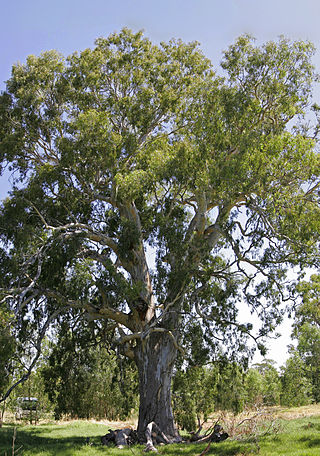
Eucalyptus camaldulensis, commonly known as the river red gum, is a flowering plant in the family Myrtaceae, and is endemic to Australia. It is a tree with smooth white or cream-coloured bark, lance-shaped or curved adult leaves, flower buds in groups of seven or nine, white flowers and hemispherical fruit with the valves extending beyond the rim. A familiar and iconic tree, it is seen along many watercourses across inland Australia, providing shade in the extreme temperatures of central Australia and elsewhere.

Acacia pycnantha, most commonly known as the golden wattle, is a tree of the family Fabaceae. It grows to a height of 8 metres and has phyllodes instead of true leaves. The profuse fragrant, golden flowers appear in late winter and spring, followed by long seed pods. Explorer Thomas Mitchell collected the type specimen, from which George Bentham wrote the species description in 1842. The species is native to southeastern Australia as an understorey plant in eucalyptus forest. Plants are cross-pollinated by several species of honeyeater and thornbill, which visit nectaries on the phyllodes and brush against flowers, transferring pollen between them.
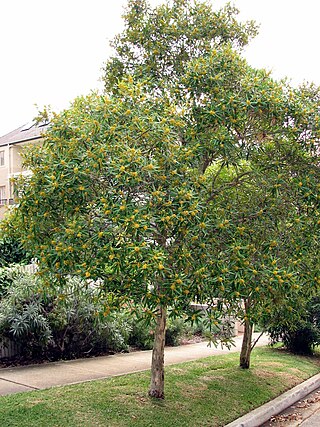
Tristaniopsis is a genus of shrubs and trees in the myrtle family Myrtaceae described as a genus in 1863. They have a wide distribution in Southeast Asia, New Guinea, New Caledonia and Australia.
The greater Brisbane area of Queensland Australia, has many species of indigenous flora. This article links the flora to its geography with:
Bunya is a suburb in the City of Moreton Bay, Queensland, Australia. In the 2021 census, Bunya had a population of 1,968 people.

Tristaniopsis laurina, the water gum or kanooka, is a tree species native to Australia. It usually grows near the eastern coastline and along the banks of streams, where the trunks and branches tend to be shaped in the direction of the current and give an indication of the flood height.

Neolitsea dealbata, also known as white bolly gum, hairy-leaved bolly gum, or simply bolly gum, is a shrub or small tree in the laurel family Lauraceae which is native to New South Wales and Queensland in Australia.
The Gums is a rural town and locality in the Western Downs Region, Queensland, Australia. In the 2021 census, the locality of The Gums had a population of 165 people.

Tristaniopsis collina, known as hill water gum or hill kanuka, is a tree of eastern Australia.
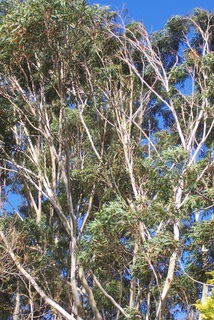
Eucalyptus pilularis, commonly known as blackbutt, is a species of medium-sized to tall tree that is endemic to eastern Australia. It has rough, finely fibrous greyish bark on the lower half of the trunk, smooth white, grey or cream-coloured bark above, lance-shaped to curved adult leaves, flower buds in groups of between seven and fifteen, white flowers and hemispherical or shortened spherical fruit.
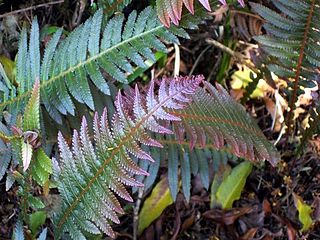
Doodia aspera, commonly known as prickly rasp fern, is a widespread and common plant, growing in eastern Australia. Often seen in rainforest margins or eucalyptus forest in Victoria, New South Wales and Queensland, it is a terrestrial fern with reddish new growth.
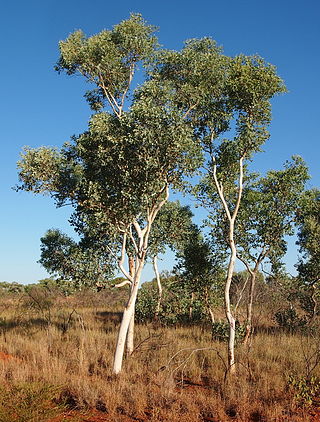
Eucalyptus alba, commonly known as white gum, khaki gum or poplar gum, is a species of tree that is native to Australia, Timor, and New Guinea. It has smooth bark, lance-shaped to egg-shaped leaves, flower buds in groups of seven, white flowers and conical to hemispherical fruits.

Eucalyptus pachycalyx, commonly known as the shiny-barked gum, is a species of tree that is endemic to north-eastern Australia. It has smooth, pale grey, mottled bark, lance-shaped or curved adult leaves, white flowers and cup-shaped or hemispherical fruit.
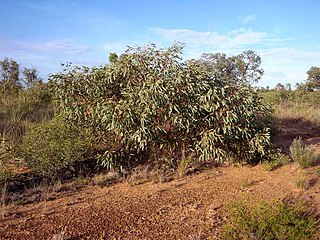
Eucalyptus ammophila, commonly known as the sandplain red gum, is a mallee that is endemic to central and southern Queensland. It has rough fibrous bark near the base and smooth greyish and orange to bronze bark higher up. It has lance-shaped leaves, yellow or creamy flower buds in groups of between seven and eleven, white flowers and hemispherical fruit with strongly raised valves.

Eucalyptus argophloia, commonly known as Queensland western white gum, Queensland white gum, scrub gum, lapunyah, Burncluith gum or Chinchilla white gum is a tree that is endemic to a small area of Queensland. It has smooth white bark ageing to other colours, narrow lance-shaped adult leaves, more or less spherical flower buds in groups of seven, white flowers and small, hemispherical to cup-shaped fruit.

Eucalyptus hallii, commonly known as Goodwood gum, is a species of small to medium-sized tree that is endemic to Queensland. It has smooth bark, lance-shaped to curved adult leaves, flower buds in groups of seven, white flower and conical fruit.















